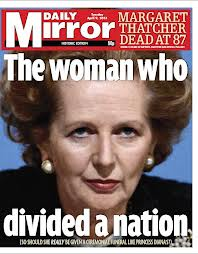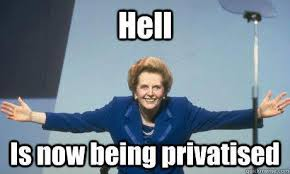|
Last night, on the day that Margaret Thatcher died, much of the mainstream media fell over itself to mourn the passing of a ‘great’ leader. There were of course some references to her being a ‘divisive figure’, but only because she did what ‘had to be done’, which politicians before her were too weak-willed to do (ie attack workers’ rights, the welfare state and beat down wages).
Even people like Henry Kissinger, a man often accused as having the blood of innocent millions on his hands, were wheeled onto our screens to tell the British public what a really outstanding leader she was. That the BBC would turn to Kissinger for such a ringing endorsement of Thatcher’s policies and personality says a lot about the mindset over at the good old ‘Beeb’.
I happened to see Kissinger on the BBC’s late night ‘serious’ new analysis programme Newsnight. Presented by senior broadcaster Jeremy Paxman, prior to talking with Kissinger, the show hosted a studio debate about Thatcher’s legacy. As elsewhere, it was a broadcast lavishly sprinkled with eulogies for the ‘great Margaret’.
Early in the broadcast a Conservative MP (or ex-MP) offered his opinion about her legacy. He stated that Thatcher served to put an end to certain debates that had raged prior to her taking power, not least the question of capitalism being the best system for delivering goods and services effectively and for wealth creation. Paxman sat there and just let this go.

Yet, later in the broadcast, leftist political figure Ken Livingstone made a comment about her legacy, which included the current a housing crisis in Britain. Paxman was on him straight away, pulling him up and tell Livingstone about Thatcher’s ‘successes’ in the housing sector. Livingstone’s comment about the housing crisis was benign when compared with the Tory person’s comments that celebrated the wonders of capitalism.
How a senior BBC presenter can sit there and not challenge someone who says the debate about socialism/capitalism is ended because capitalism has proved to be successful may well be beyond the thought process of some people. Successful for whom? For the rich and for millionaire politicians who come on to our screens and perpetuate this lie.
The banking system has collapsed and ordinary folk are being burdened with ‘austerity’ (mass unemployment, cuts to welfare and services) to pay the for bankers’ losses as a result of their gambling and criminality. Thatcher deregulated the ‘City’ which gave bankers a free rein in the first place.
Due to ‘deregulation’ in many areas, we now have virtual monopolies in various sectors, including energy, finance and transport. Manufacturing jobs have been outsourced and replaced with Macjobs or no jobs at all and underemployment. Communities across the UK are suffering from social breakdown, criminality, drugs, etc. There is a housing crisis and a personal debt crisis. And ordinary people’s share of wealth has declined (from 65 to 53 percent in the 80s alone).
Inequalities began to rocket under Thatcher and were perpetuated by ‘New Labour’, which supported her policies. Economic growth in the 80s was the same as in the 70s – wealth creation? Wealth was funnelled towards the top.
Capitalism is regarded as being so successful by its proponents because higher profits ensued as unemployment rose and labour became cheap in Britain where the unions were broken or was already cheap in the countries to where jobs were outsourced. And as the share of wealth going to labour fell, demand for goods fell, so debt was introduced to boost it. Where now, seeing the level of consumer debt was unsustainable? Capitalism cannot manage is crises, it just shifts them around in ever decreasing circles. Capitalism is in crisis because of it. Look no further than the ‘Eurozone crisis’ and the slow death of the US economy.

Capitalism (via ‘globalisation’) is devastating communities and economies all over the world, not least farmers in India who have experienced debt and poverty on a massive scale as western agribuisiness has taken over farming; and not least in terms of the illegal land grabs from tribal people in Orissa and Chhattisgarh being undertaken by the Indian govt on behalf of trans-national corporations. From Congo, Mali, Libya and Syria, so-called capitalist countries in the West, via NATO and its proxy armies, are causing devastation and conflict in order to grab the resources required to feed western capitalism’ rapacious appetite.
Whether it’s IMF/WTO backed policies that impose ‘structural adjustment’ on sovereign states or it is NATO paving the way for the looting of countries, the ‘capitalism’ often celebrated in/by the mainstream media is not based on some notion of a ‘free market’ but is based on brute force, coercion and bullying. But this is not to be discussed. This is the rantings of the ‘extremist’ or unrealistic ‘dreamer’. This is beyond the scope of what is considered ‘rational’ debate within the cosy TV studios ofLondon and ‘Westminster Village’. And because it’s beyond the scope, the real extremism, the brutality of monopoly capitalism and imperialism does not get mentioned and is therefore left unchecked by the media.
While ‘on air’ it may at times be difficult or unnecessary to launch into a wide ranging critique of capitalism, to just sit there and accept at face value and not challenge someone who espouses the greatness of capitalism is a dereliction of duty. But this is what the mainstream media specialises in. It is par for the course as far as the BBC is concerned. It’s to be expected.
I once came across an anecdote about Noam Chomsky. Apparently, he was having some trouble with his teeth, due to him grinding them. After much speculation and pondering, the cause of the grinding was pinpointed. He only did it when he read the New York Times!
I stopped watching the BBC and the mainstream media in general after the one-sided representation of the Libyan conflict. My mistake is that I tuned in to watch it again last night. Unfortunately, it’s a mistake millions make on a daily basis.
|